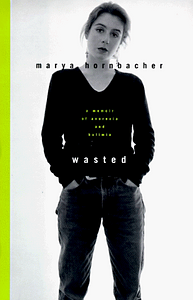You need to sign in or sign up before continuing.
Take a photo of a barcode or cover
I wanted to read something non-fiction, and I was perusing the ebooks available on the library's site, when I found this. I had heard it was good, so I decided to read it. I'm glad I did; it was a fascinating read. Although the book deals essentially with Marya's eating disorder, it goes into so much more than just her anorexia and bulimia. She talks a lot about her mental health and body image, and as a woman, a lot of what she talked about hit home. This was just a really well-written autobiography.
This was an incredibly difficult book to read.
On the surface, that seems obvious. Reading the experience of a woman living with bulima, anorexia, and a plethora of other mental health issues, is going to be a difficult read. But that's not what I mean.
Hornbacher wrote this memior at age 23. She ends the book (I did not read the modern reprint with her "updated" ending) rather solemnly, admitting that she is not cured, there is no answer, and essentially she cannot give an ending. She wrote this only 4 years after her nearth-death experience, and only 3 years after her suicide attempt. This memoir was written by someone still deeply in the grip of the things that had led her to that point in her life.
So the uncomfortableness comes from the outsiders perspective. She insists, over and again, that she had a "normal", "good" childhood and that her eating disorder just appeared out of the blue from no where.
She then goes on to detail a childhood filled with emotional trauma, surrounded by family members with mental health and food issues of their own, and as the reader we find ourselves frustratingly yelling, "it's there! it's all there! I can see it happening to you as you're writing it but you cannot see it!" Near the end of the book she still refers to her family has relatively normal, just "messy". It feels like a kick in the gut.
I have not read Hornbacher's other books. I feel almost honor-bound to do so now, to not always have my memory of this author entrenched in her view of herself at 23-years-old. None of us deserve that.
On the surface, that seems obvious. Reading the experience of a woman living with bulima, anorexia, and a plethora of other mental health issues, is going to be a difficult read. But that's not what I mean.
Hornbacher wrote this memior at age 23. She ends the book (I did not read the modern reprint with her "updated" ending) rather solemnly, admitting that she is not cured, there is no answer, and essentially she cannot give an ending. She wrote this only 4 years after her nearth-death experience, and only 3 years after her suicide attempt. This memoir was written by someone still deeply in the grip of the things that had led her to that point in her life.
So the uncomfortableness comes from the outsiders perspective. She insists, over and again, that she had a "normal", "good" childhood and that her eating disorder just appeared out of the blue from no where.
She then goes on to detail a childhood filled with emotional trauma, surrounded by family members with mental health and food issues of their own, and as the reader we find ourselves frustratingly yelling, "it's there! it's all there! I can see it happening to you as you're writing it but you cannot see it!" Near the end of the book she still refers to her family has relatively normal, just "messy". It feels like a kick in the gut.
I have not read Hornbacher's other books. I feel almost honor-bound to do so now, to not always have my memory of this author entrenched in her view of herself at 23-years-old. None of us deserve that.
emotional
sad
fast-paced
I liked the honesty that Marya writes with in this memoir. It's amazing that she's able to write with such clarity about her eating disorder just a few years after her last hospitalization. I think she's a great writer and storyteller and I would read more of her books just for that reason. Unsurprisingly, the book is dark but I think her writing style still makes it something that is enjoyable to read while feeling a lot of pain for what she's experiencing.
What a tragic portrayal of what’s it’s like to live with anorexia nervosa. The author tells her own story and I was just so scared for her while reading. She got down to almost 60 lbs and almost died many times while struggling with her disorder. If you enjoy books about mental health awareness, this is a very real depiction of life with an earring disorder ⭐️⭐️⭐️⭐️
This could easily be a work that wallows in tragedy and self-pity, or one that soars with false assuagements and platitudes. It is neither. It is horrifying and transcendental, pulling you into a world of the coldest of snows, the thickest of fogs. Hornbacher is both victim and perpetrator. People think of eating disorders as something that drops out of the sky, ferreted down on beauty magazines onto the poor unsuspecting heads of teenage girls readying for prom. This book unpacks that, drags you along for the ride. To make yourself so sick over and over again is truly madness. It's simply impossible to grasp if you haven't undergone it. Hornbacher is writer first and featurette second and it shows. Her prose is raw and skillful. She's a biting writer.
challenging
dark
emotional
inspiring
reflective
sad
medium-paced
reflective
slow-paced
dark
emotional
informative
reflective
medium-paced



